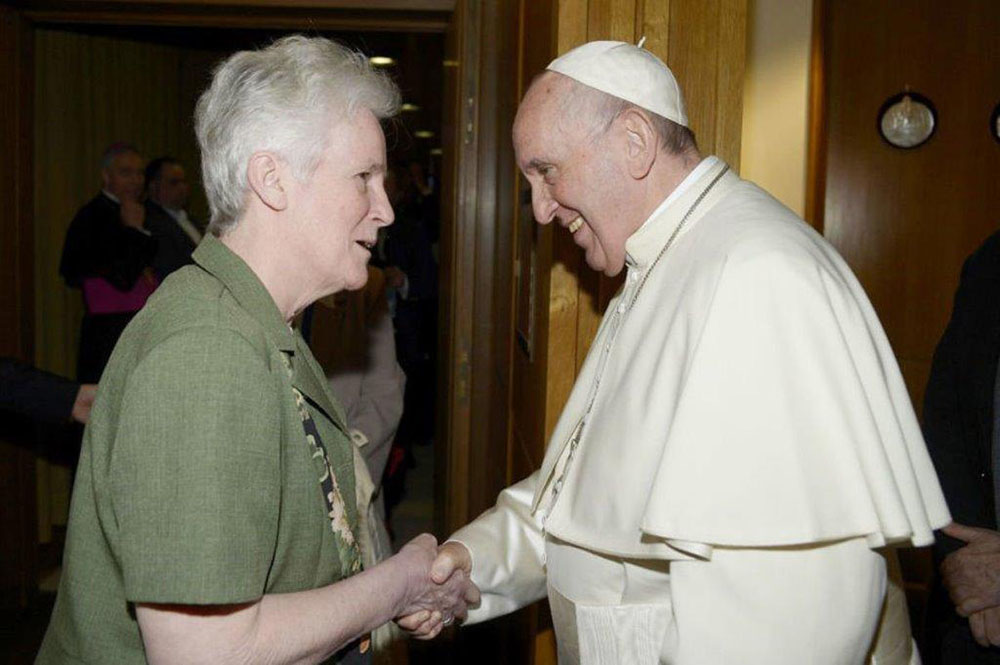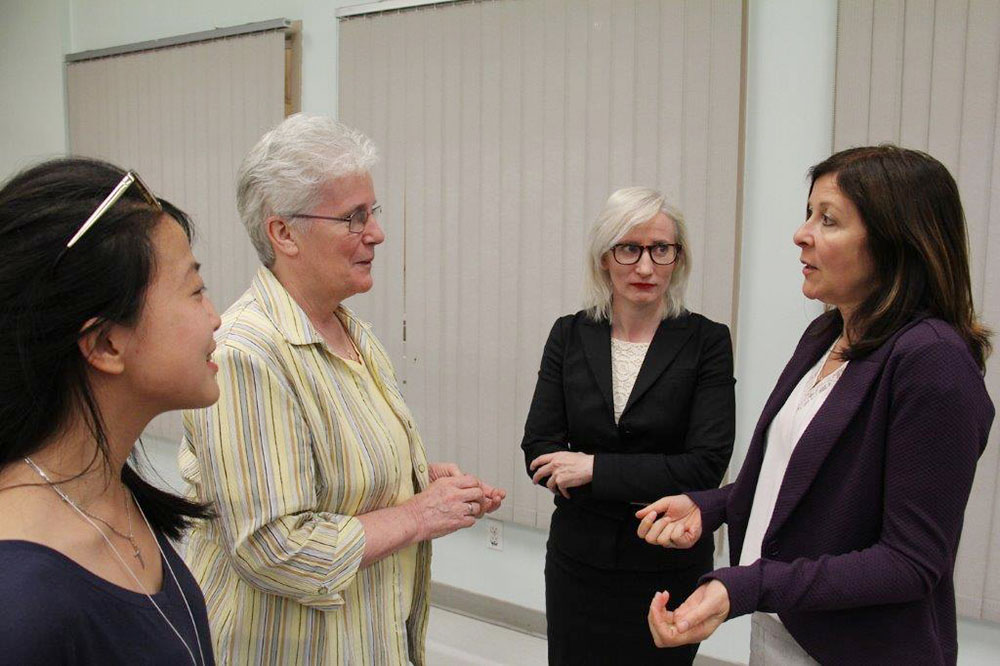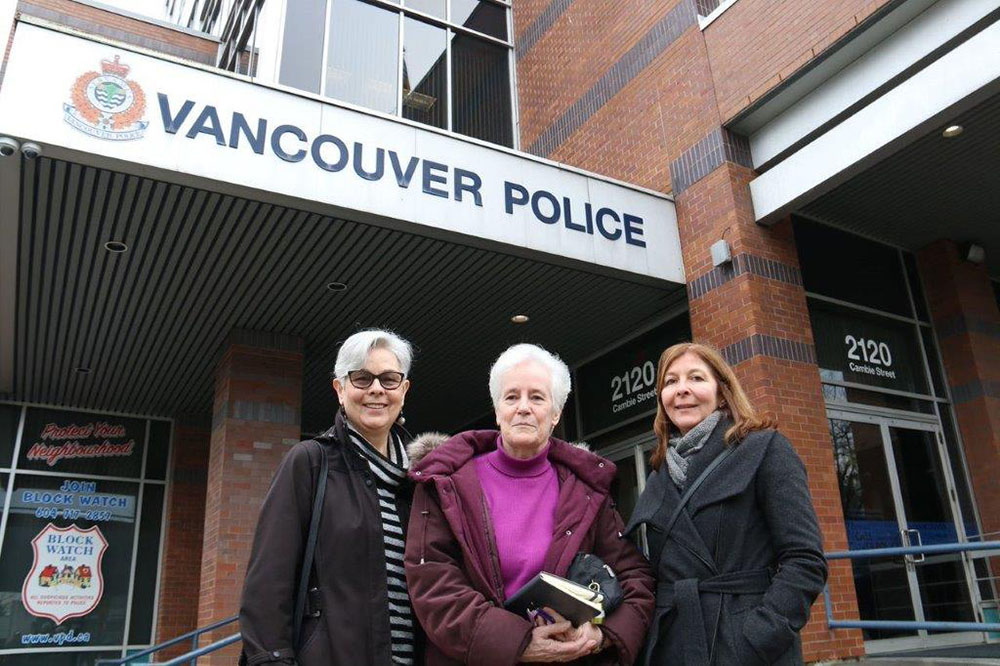
Sr. Nancy Brown met Pope Francis in April 2019 at the International Conference on Human Trafficking in Rome to introduce and study Pastoral Orientations on Human Trafficking. (Courtesy of Nancy Brown)
Sr. Nancy Brown is a sister of Charity of Halifax, Nova Scotia, living in Vancouver, British Columbia, Canada. She has over 20 years of experience in education and pastoral counseling, including elementary through high school teaching, university chaplaincy and vocation awareness. She was a formation director and novice director for the Sisters of Charity and an ombudsperson at Covenant House Vancouver.
In recognition of her leadership role in fighting sexual exploitation and human trafficking, especially concerning youth and young adults, Brown was also awarded an honorary doctorate, St. Mark's College's highest honor. She agreed to an interview with Global Sisters Report, which has been edited for length and clarity.
Global Sisters Report: Can you describe your background and ministry?
Brown: My ministry took me to the peripheral in my 20 years of journeying with street youth at Covenant House Vancouver. Most youth experienced sexual abuse and neglect in the family, which caused them to live a life of poverty and addiction without a place to call home.
When I returned to my hometown in 1998, the call to serve with Domestic Abuse Services (Our Lady of Good Counsel) came quickly, as I had just completed courses on working with abused women and children, working with abusers, as well as addiction counseling. While taking these courses, I volunteered for several years at Interim Place, a shelter for abused women and children in Mississauga, Ontario, where I would often accompany women with a police escort back into their abusive homes to reclaim important documents, etc.
Domestic Abuse Services was in its infancy and needed a teacher to train volunteers for the helpline and direct services. For approximately 10 years, I facilitated a 10-week course twice a year throughout the archdiocese and served on the board and other committees.
Advertisement
What is your full-time occupation now?
At my retirement celebration from Covenant House Vancouver, I promised the youth that I would continue to advocate for justice in our world to help eliminate the cycle of sexual exploitation that entrapped many of them through no fault of their own. Their amazing stories motivated me to work for a better life for them.
Currently, I serve on several committees, both at the local and national levels. VCASE — Vancouver Collective Against Sexual Exploitation, ALLY — a national group for support and exchange of information; CCC-SEWG — Sexual Exploitation Working Group of the Canadian Council of Churches; and AHT — Archdiocese of Vancouver Anti-Human Trafficking Committee.
All committees are actively involved in addressing current issues related to any form of sexual exploitation, particularly affecting women and children. I co-chair the SEWG committee, which hosted several webinars last fall on buyer demand and child online safety.
How did you come to advocate for these issues?
The stories of the Covenant House youth have never left me. [They] lack the knowledge, experience and education to understand their circumstances. They are voiceless, lacking the tools, skills or freedom to advocate for themselves. They are the silent victims of adult male aggression and desperately need adults to speak the truth and stand for justice. Until there is greater gender equality and less male exploitation and violence in our global community, our struggle for justice for the voiceless and care for the exploited will continue.
Early in my ministry at Covenant House, I became a member of REED — Resist Exploitation Embrace Dignity, a local group of committed Christians who wanted to effect change in our city for prostitute persons. This committee worked tirelessly to educate the public and called on the government to address the issues of prostitution/human trafficking. The Anti-Human Trafficking Committee of the Archdiocese of Vancouver was established primarily to educate the Catholic population about the scourge of human trafficking.

Sr. Nancy Brown and members of the Archdiocese of Vancouver Anti-human Trafficking Committee enjoying a break during a presentation to a youth group in Richmond, British Columbia. (Courtesy of Nancy Brown)
Why are these matters so important to you?
Women and children continue to be the most oppressed in our society, and until there is a radical awakening to issues of male domination and violence, our advocacy must continue. One day at Covenant House Vancouver, a youth I knew very well came into my office and announced that she was going to heaven ahead of me. She quoted to me the Beatitudes.
I was stunned and humbled by this experience, causing me to reflect more deeply on the unjust and ongoing sufferings of those caught in this exploitation. As Christians, we are called to live as Jesus lived — his core ministry was caring for the poor and his special love for children. "Let the children come to me" (Mt 19:14).
In 2008, my religious congregation took a corporate stance on human trafficking, stating, "We Sisters of Charity-Halifax, called to be prophetic women in a world wounded by violence and stripped of hope, are committed to making the love of God visible in our world by serving persons who are poor, especially those who through shame conceal their necessities."
We stand together in a time when we hear the silent cries of victims of human trafficking, especially those women and children taken for sexual exploitation and forced labor. We commit ourselves to work to eradicate this global human rights violation and affirm the dignity of all human beings. Our foundress, St. Elizabeth Seton, and St. Vincent de Paul, are models of lovingly caring for children, advocating for women and serving the poor.
You are actively working on Bill S-210 in Canada. Can you tell us about it?
Bill S-210 (Protecting Young Persons from Exposure to Pornography Act) is a private member's bill introduced by Sen. Julie Miville-Dechene to the Senate on Nov. 22, 2021. It has been studied by the Public Safety and National Security Committee, and we eagerly await their conclusions. This bill would require sexually explicit websites to verify the age of their users to prevent minors from accessing them. Verification would be with robust technology that protects individual privacy.
Why is this important? Over 60% of youth first view pornography accidentally. An analysis conducted by the Canadian Centre for Child Protection in 2016 showed that nearly 80% of the images that cybertip.ca examined contained depictions of children below the age of 12, with the majority under the age of 8.
The National Council of Women in Montreal has taken the lead on this issue and stated in their published open letter that over 100 organizations have signed this bill.
Offline, Canada already has in-person age standards for alcohol, cannabis products, vapes and tobacco, as well as restrictions on gambling and casinos and bars. Why not online?
We have encouraged the public to sign a petition on change.org and form letters on the Defend Dignity website regarding Bill S-210. As long as porn exists, there is no chance of creating a fair and equal world.

Sandra Harrison, Sr. Nancy Brown and Evelyn Vollet at a Vancouver police station for the announcement of 47 men arrested for paying for sex with teenage girls in January 2019. (Courtesy of Nancy Brown)
You are also working on Bill C-270. Has this bill passed yet?
Bill C-270 (Stopping Internet Sex Exploitation Act) would amend the criminal code to prevent the exploitation of individuals online. It would require porn sites to verify ages and consent of individuals appearing in their content before the creation and distribution of those materials. Member of Parliament Arnold Version introduced this bill, which passed the first reading in the House of Commons on April 28, 2022, and the second on May 8, 2024. It awaits the name of a committee to study this bill. At that time, we will actively endorse this bill with briefs to the committee.
How can parents prevent children from being exposed to pornography online?
Parents, guardians and caregivers need to be more proactive about their children's online safety and not assume that children's apps and websites are safe. Parents need to educate themselves with knowledge and technology to assist in keeping their children safe online. They need to have conversations with their young children about the effects of pornography and their relationships with others.
All adults ought to be supporting, advocating and speaking to their members of parliament to get Bills S-210 and C-270 passed as soon as possible.
What motivates you to advocate for these matters despite resistance?
Resistance is normal and expected. These topics always cause lively debate. Not everyone is knowledgeable about the facts and the cause of human trafficking. It is a global problem, with approximately 49.6 million people in modern slavery worldwide, with 12 million being children. Most Canadians are still ignorant of the prevalence of these issues in their backyards.
There are always setbacks in this ministry, but staying true to our values [and] our work is essential. A deep understanding of justice and compassion for the poor of the world is primary, as well as a community of persons striving for the same goal.
"There are always setbacks in this ministry, but staying true to our values [and] our work is essential."
— Sr. Nancy Brown
What difference can a single religious sister make in fighting these matters?
At times, being a religious sister can be a disadvantage in promoting this issue, as some people dismiss your words as moralistic and influenced by church authority. On the other hand, I believe that women religious can be strong advocates, bringing their spirituality and compassionate care for the poor of the world to the table.
In April 2019, the Archdiocese of Vancouver generously sent me to Rome for an International Conference on Human Trafficking. At this meeting, Pastoral Orientations on Human Trafficking, published by the Migrants & Refugees Section of the Dicastery for Promoting Integral Human Development, was presented to us. Through a process of study and dialogue on the various realities of human trafficking, we completed our days with a list of conclusions and proposals for action, with the expectation that in our home diocese, we would start a process of implementation.
Many women religious throughout the world work on this issue because of the reality of hundreds of children's lives destroyed by the powers of war, violence and aggression. Young children are forced to migrate to other countries alone, thus the prime targets of traffickers. Other children are forced to be soldiers at incredibly young ages. Who is going to stand up for these children who have lost their parents in war or violence?
What is the responsibility of Christians in these matters?
The Gospel and the church call all to minister in this area despite the difficulty. From a Christian viewpoint, the sanctity of human life from conception until natural death and the inalienable dignity of every human being constitutes the starting point and the central focus of our faith. The Bible teaches that every woman and man is created out of love and made in God's image and likeness. This shows us the immense dignity of each person, who is not just something but someone.
The social justice teachings of the church are concrete actions for living the Gospel. The Catholic Church insists upon every person's intrinsic worth, dignity and right to live in safety — with no exceptions. It affirms that food and health care are not privileges reserved for the wealthy but universal rights.
And especially relevant today, the Catholic Church affirms that we all have a right to migrate to seek a safe, good life for ourselves and our families and that nations have a moral imperative to welcome immigrants. We are encouraged to work for the common good ahead of individual gain and power grabs.
Our commitment to justice must embrace charity. It is God's love that sustains this challenging work.
Our work is not finished. The prophet Micah continues to speak to me loudly and forcibly. We are all called "To love tenderly, to act justly, and to walk humbly with our God."






